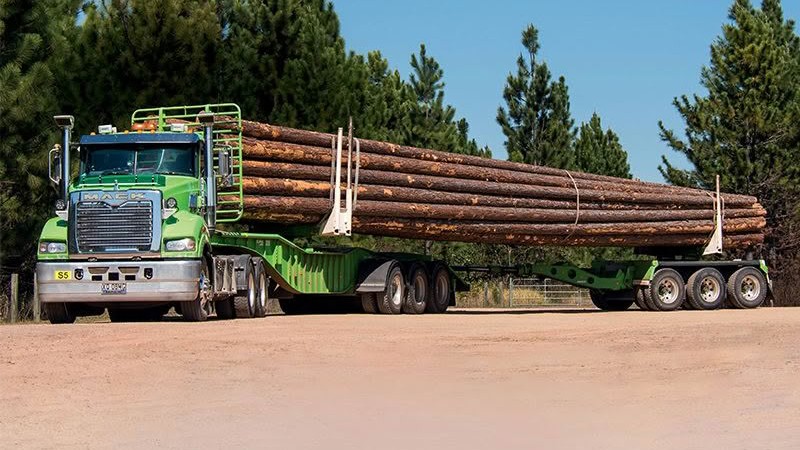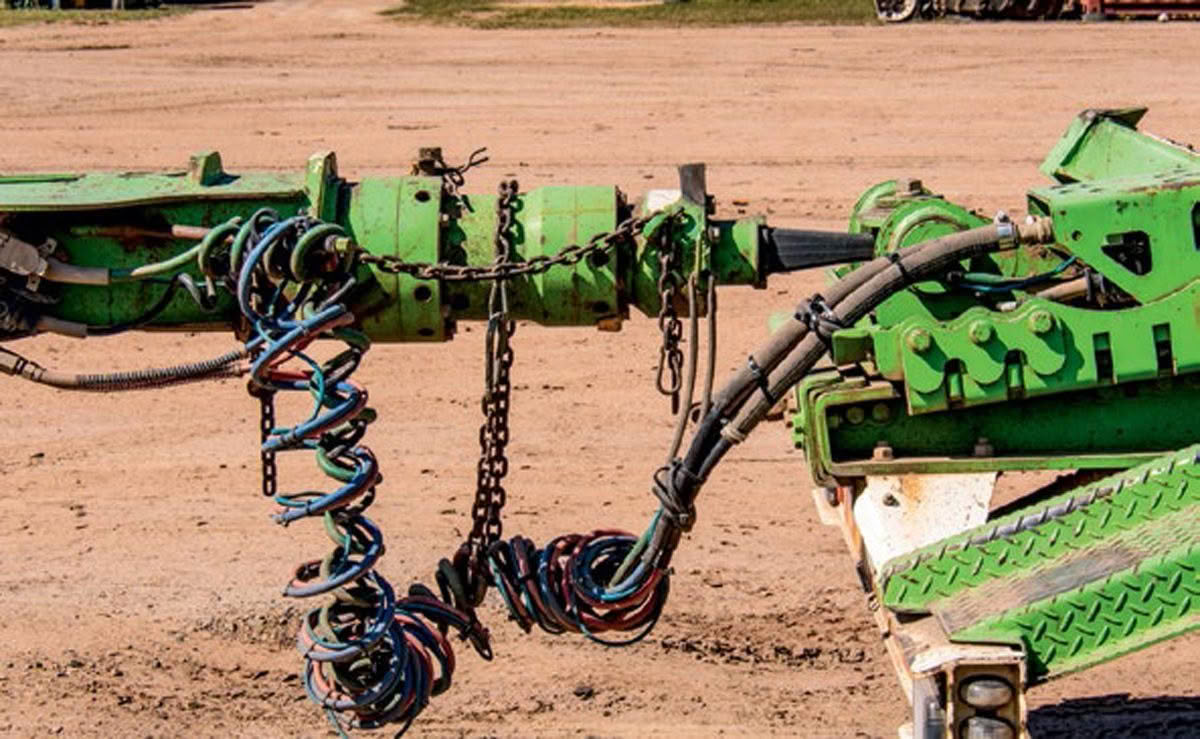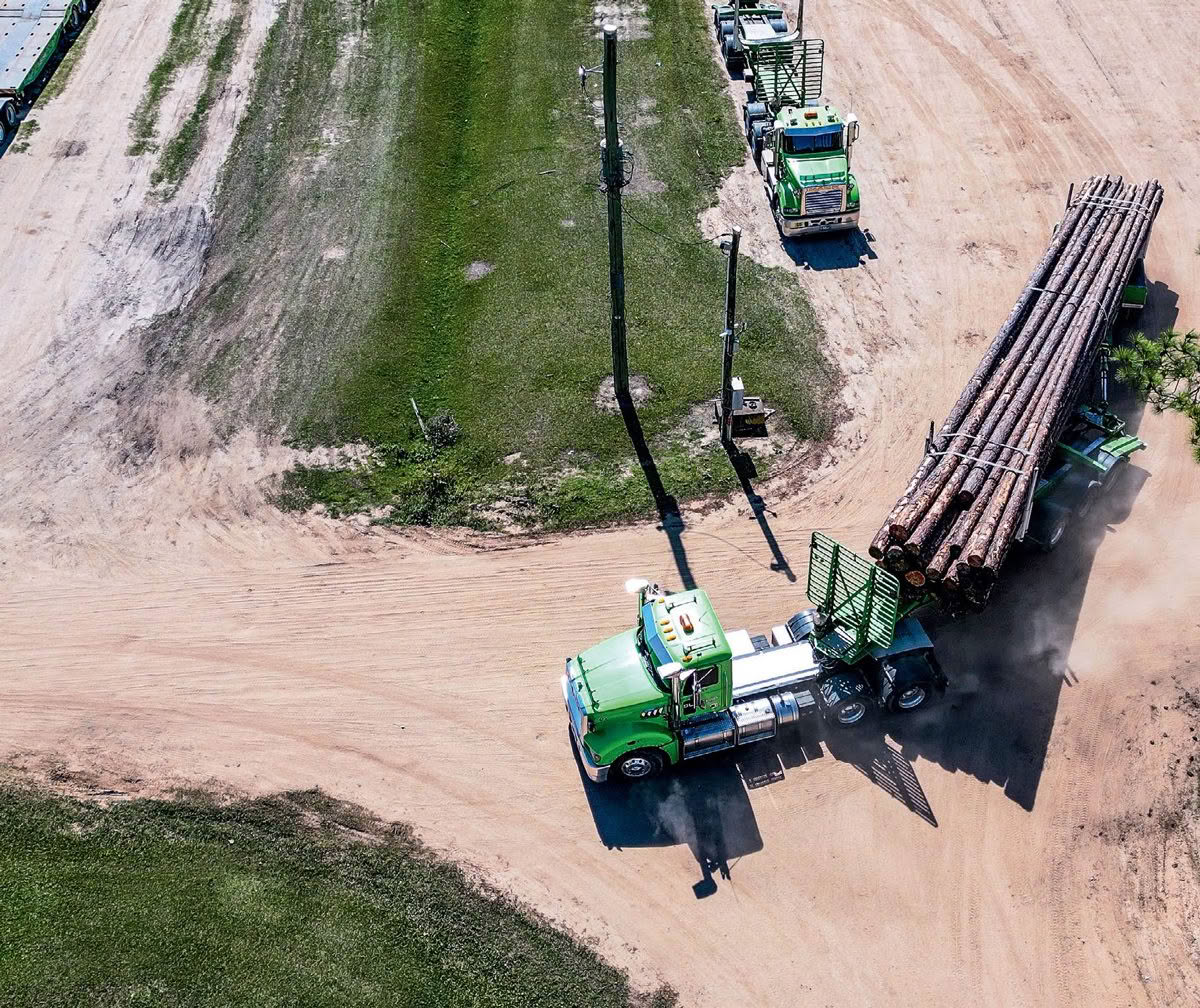
Queensland-based Sunchip Group has relied on Elphinstone trailers and weighing systems in one form or another for over three decades. Thanks to the proven reliability of those original trailers, it has ordered 10 more.
Roughly three hours’ drive north of Brisbane, hidden within the Tuan State Forest, lies a bustling hub of Queensland’s timber industry. As dawn breaks, the bright green Mack Super- Liners, towing their Elphinstone Long Logger trailers, rumble along neatly graded gravel roads on their daily pilgrimage to transport plantation timber to the sawmill.
What sets this operation apart, however, is a marvel of modern ingenuity – the Elphinstone Long Logger trailers. These behemoths of timber transport are more than mere carriers; they are architects of efficiency, designed to cradle vast loads of sustainable plantation timber with consistent high payload accuracy and unwavering stability.

“The Sunship Group is a harvesting and haulage contractor based in the Fraser Coast region in Queensland,” Michael Whish-Wilson, transport supervisor Tuan and Toolara Forests, explains. “We’ve been operating here for the last 26 years, and for most of that, we have been using Mack trucks and Elphinstone logging equipment. Today, we run about 15 of their units. We predominantly use Long Logger trailers working around the clock, 24 hours a day, five days a week. Mark Blackberry, owner and founder of the Sunchip Group, worked with Graeme Elphinstone to develop the Long Logger trailers. These unique trailers allow us to cart up to one and a half million tonnes of sustainable plantation pine annually.
“The Long Logger trailers permit us to do such high volumes because they allow us to safely cart long lengths up to 18.3m on the B-Double route and achieve a 45-tonne payload with fast loading and unloading times.”
To cope, the Super-Liners were specced with the 510kW (685hp) MP10 and mDrive with HD shift option. Here’s an engine, for example, which, at the 685hp setting, produces maximum torque from 1000 to 1550rpm and peak power from 1550 to 1800rpm. It is matched to a transmission specifically programmed to allow the engine to pull down deep into the rev range before downshifting. However, at the other end of the scale, it upshifts surprisingly early to maximise the engine’s phenomenal pulling power. Yet none of these traits do anything to harm fuel efficiency.
“When you throw a 45-tonne load of logs on the back, it needs plenty of power to climb the hills around here,” Michael adds.


Mack engineers spent several years researching, developing and testing a beefed-up version of the mDrive before releasing the HD option for on/off-road duty. Back at the launch, they explained that the HD option has tougher gears and synchronisers than the on-highway mDrive released in 2010 (which, incidentally, more than half of all customers for highway Macks now choose). Conversely, the HD model also has a more efficient oil cooler and uses higher-viscosity synthetic lube oil. The 12-speed mDrive HD is rated for up to 2793Nm (2060lb/ft) torque input.
Weight and price are usually critical factors in the decision-making process when purchasing heavy trucks, and the mDrive is among the lightest transmissions on the market. Surprisingly, Mack’s single-countershaft mDrive weighs about the same as a comparable Eaton 18-speed manual transmission with twin countershafts and far less than the heavy-duty triple-countershaft Mack manual.
Michael says that the mDrive always appeared to pick the correct gear no matter how fast or slow he drove or whether he was on undulating or flat terrain. “It just seems to get it right every time,” he adds.

As for the Long Logger trailer, it is essentially a hybrid between a skele trailer and a jinker. The skele trailer is upfront, and the stinger-steered jinker is connected to the rear of the front trailer. The trailer folds and unfolds automatically; there’s virtually no manual input from the drivers, and they can do almost all of it from the comfort of the cab. The trailers are very user-friendly, and best of all, you know they work day in and day out.
“The original Long Logger trailers we started running back in 2008 had a lifespan of about 15 years and covered millions and millions of kilometres. To put that into perspective, we replace prime movers every four to five years and merely connect the new trucks to the older trailers. I think each of those original trailers carted well over a million tonnes per unit over their lifespan. Mind you, we have a comprehensive maintenance programme to ensure all our equipment gets maintained in first-class condition,” Michael adds.
“One important thing to mention about these trailers is that we use Elphinstone’s easy-weigh multi-reader in the truck cabin connected to 1660-loadcells mounted under each bolster on the trailers to weigh each load accurately. Our overload percentages are virtually zero, a terrific result given that we’re doing 100-plus B-double loads of timber a day and go months and months without a single overload. In an environment with so many variables, still having such reliability out of the scales is just unreal.”

The investment in accurate onboard scales certainly pays big dividends in the long run, Michael explains. “For example, if we underload each truck by as little as 1.5 tonnes per load, that means we’re losing over 150 tonnes of productivity per day. That’s 750 tonnes per week, equivalent to about 16 extra loads we’d need to do to cart that same amount of wood. I can’t emphasise the importance of accurate onboard scales enough.”
As the sun dips below the horizon, the rhythmic hum of machinery gradually fades. Sunchip Group’s pine logging operation lingers, etched into the very fabric of the landscape. In the waning light, the imposing figures of the Mack Super-Liners and their Elphinstone Long Logger trailers stand tall, weaving their way through the labyrinth of trees laden with 45 tonnes of sustainable plantation timber.
Read more
The sale is on!
0 Comments7 Minutes
Running north
0 Comments13 Minutes
Changing the Game
0 Comments10 Minutes





